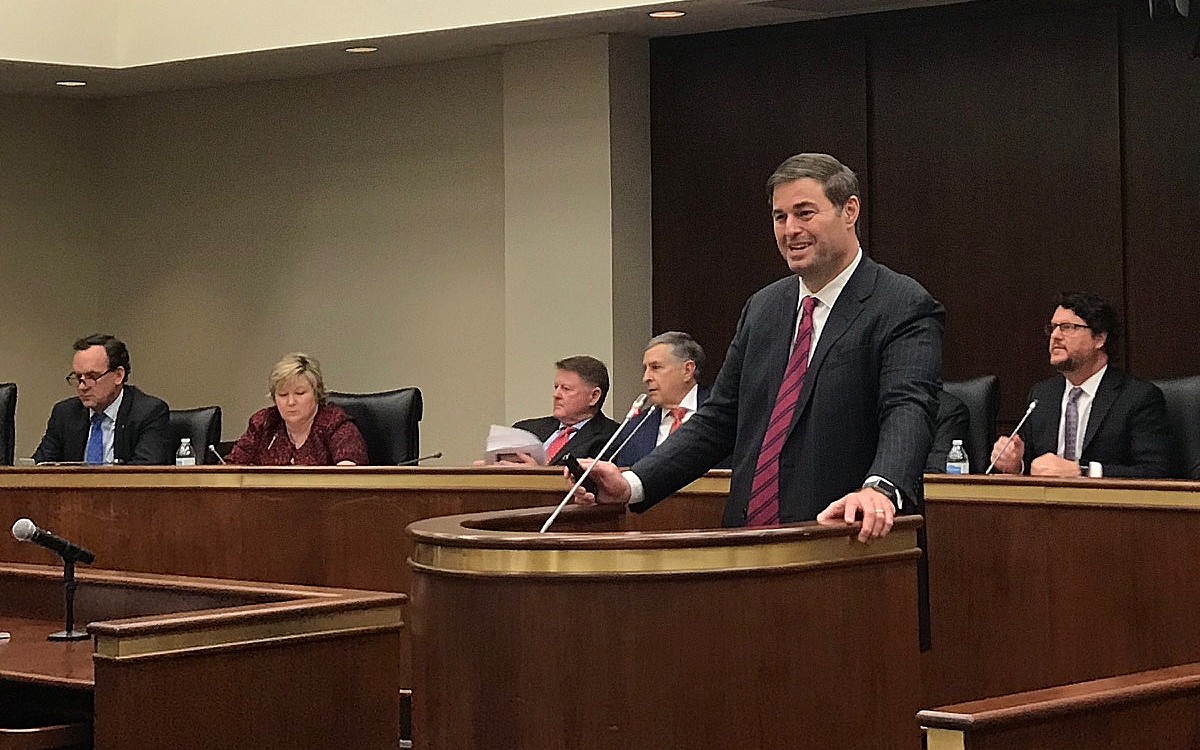INSIDE ISSUE 19.10 | March 6, 2020
 BIG STORY: “Climate doesn’t care” who owns Santee Cooper, expert says
BIG STORY: “Climate doesn’t care” who owns Santee Cooper, expert says
NEWS BRIEFS: House budgets $11 more per student for education
COMMENTARY, Brack: Keep calm and wash your hands
SPOTLIGHT: S.C. Hospital Association
MY TURN, Wilson: Antiquated Constitution may be political burden
FEEDBACK: Debate column was spot-on
MYSTERY PHOTO: Light and reflections
“Climate doesn’t care” who owns Santee Cooper, expert says

By Lindsay Street, Statehouse correspondent | The 111-page legislatively-mandated state report that evaluates three alternatives for public utility Santee Cooper has no mention of “climate change” or “pollution.”
But climate change, conservationists say, should be a significant part of the ongoing discussion of the utility that serves 2 million customers since any decision could dramatically reshape local carbon emissions and alter watersheds.

“The climate doesn’t care who owns (Santee Cooper). It cares what we do,” Coastal Conservation League Energy and Climate Program Director Eddy Moore told Statehouse Report this week. Last year, Moore said resolution of Santee Cooper’s future would be one of the biggest climate decisions for South Carolina to answer.
So far, however, lawmakers and the bidders appear focused more on rates for customers, than impacts to the climate, which generally align with less coal-fueled power generation and more renewable energy.
Where we are now
Santee Cooper’s future has languished for years as lawmakers have batted it back and forth following the very public 2017 demise of a nuclear power plant expansion with private partner South Carolina Electric and Gas. The debacle cost more than $9 billion, led to the sale of SCE&G to Virginia-based Dominion Energy and a leadership shakeup at Santee Cooper, which held a 45 percent share in the project.
For the past three years, lawmakers have pondered whether the public utility would be better off and more responsive to market demands in private hands. Santee Cooper is one of the largest public utilities in the country.
Bids submitted to the state included an $8 billion buy by Florida private utility NextEra, Santee Cooper’s plan to reform, and a management bid by Dominion Energy.
The House and Senate budget-writing committees Thursday threw out all three bids presented by the S.C. Department of Administration report on Thursday. The House Ways and Means Committee seeks House approval for a bill that would reform the utility as a select team of senators and representatives renegotiate a sales bid. The Senate Finance Committee seeks Senate approval for a bill that would task lawmakers with reforming Santee Cooper.
Bids seek more solar, less coal
While there is no mention of climate change in the Department of Administration report, the bids from the utilities contain 14 references to “solar,” 16 references to “renewable,” and six references to “carbon.” “Improving resource mix” and reducing carbon dioxide emissions is mentioned in all three bids.
The bids all seek to increase solar by about 1,000 megawatts over the next four years, and shutter the existing coal plant, Winyah, in Georgetown.
Conservation League’s Moore said climate action is more “tacit” than “explicit” in the report, adding that the bids mostly cite economic, not environmental or community, reasons for going “greener.
Statehouse Report reached out to NextEra, Dominion and Santee Cooper to discuss whether climate change played a role in their bids.
Dominion spokesman Ryan Frazier responded to the request with a statement:
“At Dominion Energy, our mission is to provide safe, reliable and affordable energy to our customers, and we aim to do so while minimizing our impact on the environment.”
When asked for the opportunity to talk to someone or ask further questions, Frazier responded: “The statement speaks for itself.” The spokesman did not respond to a follow-up email.
NextEra did not respond.
Santee Cooper on climate change and its proposal
Gullah Geechee Chamber of Commerce founder and head Marilyn Hemingway of Georgetown testified to the House’s ad hoc committee Santee Cooper bids on Monday. She told Statehouse Report that the question of carbon emissions and water impacts of Santee Cooper is foremost on her mind.
 “Santee Cooper has not been a good community partner,” she said. “They should be a leader in addressing issues such as climate change and its impact on marginalized communities.”
“Santee Cooper has not been a good community partner,” she said. “They should be a leader in addressing issues such as climate change and its impact on marginalized communities.”
She said the utility has moved too slow on renewable energy sources, and it has discounted its impact on waterways that has led to marsh loss and more flooding.
“Most of the Gullah community is in their service area,” she said. “They (have been) fighting against addressing climate change rather than being a leader … The Gullah community is being directly impacted by climate change, loss of land, rising waters.”
Hemingway said the utility should be sold.
But Santee Cooper Manager of Corporate Communications Mollie Gore said the utility has “a pretty good track record” on protecting wetlands, and it has been responsive to renewable energy, while keeping rates low and reliability high.
“In terms of thinking about environmental stewardship, which is bigger than climate change … we’re closing 1100 to 1200 megawatts of coal generation over the next seven years and we are adding solar power,” Gore said. “The cumulative effect of that is it will have a 43 percent reduction of carbon emissions.”
She also cited the headwater restoration at Camp Hall in Berkeley County, where Volvo has its manufacturing plant, and wetlands restoration at the former Grainger station in Conway.
“Even before the reform plan, we pulled together a completely new resource plan that transforms the mix of resources that will be providing electricity to two million people in South Carolina,” Gore said.
CCL wants bigger reform
Moore said the Conservation League is neutral on which entity owns or manages Santee Cooper, although the NextEra bid is “significant for (reducing) carbon emissions.”
But no matter the path forward, the League is pushing for bigger reforms.
“We think (any bid for Santee Cooper) should be submitted to the Public Service Commission where interested parties can review and make suggestions,” Moore said. NextEra’s bid sought to evade PSC regulation for four years, and Santee Cooper has never come under PSC regulation.
“We need governance and oversight regardless of who owns it,” he said.
Leaders at the Statehouse — Gov. Henry McMaster, House Speaker Jay Lucas and Senate President Harvey Peeler — did not reply to requests for comment.
Walhalla Republican Sen. Thomas Alexander, who serves on the S.C. Floodwater Commission and chairs the Senate Labor, Commerce and Industry Committee, said lawmakers are looking at the “purely business” aspect of Santee Cooper’s future. That means mostly relying on customer cost and debt.
- Have a comment? Send to: feedback@statehousereport.com
House budgets $11 more per student for education

By Lindsay Street, Statehouse correspondent | A draft of the state budget shorts public K-12 students nearly $600 each in a year of a record surplus and revenues.
The House will begin budget deliberations Monday on the state’s $9.6 billion spending plan, which has about $1.8 billion in record increases of revenues.
The House Ways and Means Committee increased the base student cost from $2,489 in 2019-2020 to $2,500 in the proposed budget, an increase of $16 million. The state formula for base student cost, however, requires $3,164 for it to be fully funded, which would cost $652 million, according to committee staff.
At an early budget hearing at the Blatt building on the Statehouse grounds in Columbia Wednesday, Hopkins Democratic Rep. Wendy Brawley asked why it’s not fully funded. K-12 education budget subcommittee chair Bill Whitmire, R-Walhalla, responded:
“That’s all the money we had. We had to choose: $3,000 [each] for teachers or the base student cost not being as high.”
The proposed across-the-board, state-funded teacher pay raises will cost $213 million, in addition to regular pay raises for years in a teaching position.
House Speaker Jay Lucas’ media liaison Nicolette Walters said the budget does more for education beyond base student cost with $10 million for more school resource officers, $60 million for capital improvements, $76.5 million for instructional materials as common core is phased out, $26 million for school buses, and $53 million for bringing 4K statewide.
Speaker Pro Tempore Tommy Pope, R-York, said the base student cost is calculated through a formula that needs to be examined and reworked by legislators. The Senate Education Committee has already tasked a panel to look at education formulas.
With a potential for additional revenues in projections by state budget forecasters, the Senate could increase the base student cost allocation but it is unlikely to meet the full requirements by law, sources say. House Education and Public Works Chair Rita Allison of Lyman said she hoped the Senate will increase it.
What else is in the budget?
Overall, the total budget is $31.3 billion with $9.3 billion in federal funds, $9.6 billion in state revenues, and $12.4 billion in other funding. Here are some highlights from the House version of the budget, before it hits floor debate Monday:
- A one-time $100 nonrefundable tax credit for taxpayers; Cost: $128 million;
- Addition of $122 million to general fund reserves, $13.6 million to the capital reserve fund, and $50 million for disaster relief, which should have an accompanying bill for resiliency funding that will begin to work its way through the House in the coming weeks;
- The S.C. Department of Transportation is slated to get $77 million for repaving 240 miles of secondary market roads and other projects; Counties would get $500,000 each (total spending of $23 million) to use on their roads.
- Merit-based pay raises for state employees totaling $42 million, representing increases of 2 percent across the board, but at agencies’ discretion;
- Nearly $40 million in the state absorbing additional health care costs for employees; and,
- An additional $32 million to boost state pension contributions as the fourth installment of a six-year plan.
South Carolina’s debt represents 0.26 percent of the budget. By constitutional law, the state can have up to 5 percent of its budget as debt. What this means is that the state can afford to borrow low-interest money for big projects. Perhaps that’s why Ways and Means Chairman Murrell Smith, R-Sumter, floated the possibility of a bond bill at Wednesday’s hearing.
In other news:
![]() Senate passes education bill, work begins in the House. The S.C. Senate passed a big education omnibus bill 40-4 this week, but now work will begin again in the House, according to Allison. She said the House Education and Public Works Committee will likely hold hearings and explore the differences between the House and Senate versions of the bill in two weeks — after getting through the budget next week and a furlough the following week. “We still have some work to do before it’s over,” she told Statehouse Report.
Senate passes education bill, work begins in the House. The S.C. Senate passed a big education omnibus bill 40-4 this week, but now work will begin again in the House, according to Allison. She said the House Education and Public Works Committee will likely hold hearings and explore the differences between the House and Senate versions of the bill in two weeks — after getting through the budget next week and a furlough the following week. “We still have some work to do before it’s over,” she told Statehouse Report.
Grimsley unanimously approved to be head of state veterans department. The Senate unanimously approved Wednesday Maj. Gen. William Grimsley of Beaufort as the director of the new state Department of Veteran’s Affairs.
Justice officials to visit S.C. juvenile prison. Officials with the U.S. Department of Justice will come to Columbia soon to work with state leaders on overhauling South Carolina juvenile prisons after federal agents found constitutional violations at the Broad River facility. Read more.
Orangeburg senator stalls budget transparency bill. Orangeburg Democratic Sen. Brad Hutto formally objected to a bill that would change Senate rules and require the state budget to disclose a description of each earmark, including costs and which legislator requested the earmark. The objection hits the pause button on the resolution moving forward for now. Read more.
Fentanyl legislation sees movement in Senate. S.C. Rep. Russell Fry, R-Surfside Beach, has led the House’s opioid epidemic response bills. One of his bills, House Bill 3730, which would create a felony for trafficking in the powerful opioid fentanyl. It will soon be added to the Senate Judiciary Committee for review. He also has two bills (co-prescription of opioid overdose antidote for some high-risk patients, and regulations on opioid treatment providers) on the House contested calendar. “I’m encouraged there has been some movement,” Fry told Statehouse Report.
- Have a comment? Send to: feedback@statehousereport.com
Keep calm and wash your hands

By Andy Brack, editor and publisher | The flu that you prepare for every winter kills about 100 South Carolinians every year, according to state health data.
 To make sure you don’t get it, you do common-sense things: Get a flu shot, wash your hands more, cover your mouth or nose when you cough or sneeze, and stay at home when you’re sick.
To make sure you don’t get it, you do common-sense things: Get a flu shot, wash your hands more, cover your mouth or nose when you cough or sneeze, and stay at home when you’re sick.
While the outbreak of the Chinese coronavirus known as COVID-19 has about 100,000 cases worldwide and has started to infect some Americans, there are no reported cases as of March 6 in South Carolina. But sooner or later, it likely will get here thanks to our increasingly interconnected world.
As the media go into hyperdrive over a potential medical crisis with huge political implications, it’s good to keep in mind that the same things you do to protect yourself and your family from flu are what you’re supposed to do to keep safe from coronavirus. Just like the flu, the elderly and people with health problems are the most vulnerable. Just like the flu, you can be proactive to minimize your risk.
“The virus may be novel, but you really don’t need to buy anything new or special to brace for it,” The Washington Post reported this week after talking to epidemiological experts. You don’t, for example, have to rush to stores, stock up on disinfectants or horde medicine and food.
Don’t panic, experts caution. Keep calm. Wash your hands, often. (And do it the right way — with soap and water for 20 seconds like your mother may have taught you.)
In other words, use common sense. Yes, there’s a risk with this disease. But there is one every year with the flu, too.
Early Friday, the federal government’s HealthCare.gov sent the following email widely:
“You’ve likely heard about the Coronavirus (officially called “2019-Novel Coronavirus” or “COVID-19”) in the news. While the immediate health risk remains low to Americans and there isn’t a vaccine yet, there are still ways that you can help prevent the spread of this virus.
“To prevent the spread of this illness or other illnesses, including the flu:
- Wash your hands often with soap and water,
- Cover your mouth and nose when you cough or sneeze,
- Stay home when you’re sick, and
- See your doctor if you think you’re ill.”
 Dr. Linda Bell, the state’s epidemiologist, testified similarly to the S.C. Senate Medical Affairs Committee on March 5 on dealing with this strain of coronavirus. As of this week, about 130 people in South Carolina had been or were being monitored for the illness, but no positive cases were detected, she said.
Dr. Linda Bell, the state’s epidemiologist, testified similarly to the S.C. Senate Medical Affairs Committee on March 5 on dealing with this strain of coronavirus. As of this week, about 130 people in South Carolina had been or were being monitored for the illness, but no positive cases were detected, she said.
“The Centers for Disease Control notes that while the potential threat to the public health in the U.S. and worldwide is high, an individual’s risk is dependent on exposure and remains low for most Americans,” she told state senators. “Those people with a greater risk of exposure are travelers from affected areas, health care workers and the close contacts of COVID-19 cases.”
She said ways to slow the illness on a group level included social distancing, which means limiting large group gatherings, closing buildings and cancelling certain events. Individuals can help, too.
“DHEC’s recommendations for prevention are
- to get the flu vaccine if you have not already done so during this flu season,
- to wash your hands frequently with soap and water for 20 seconds,
- to practice good respiratory hygiene, such as covering your cough and sneeze and disposing your tissues promptly that may be contaminated with respiratory droplets, (and)
- to stay home from school and work and other places where people have close contact with each other if you are sick to avoid exposing others.”
Other measures, according to various reports:
Stop touching your face, eyes, nose and mouth. We do this much more than we realize (two dozen times an hour, according to one study). If you have a facial itch, cover your fingers with a tissue to scratch. To curb touching your face, keep your hands busy.
Clean surfaces and objects you frequently touch — doorknobs, refrigerator handles, remotes, phones, countertops, machines and appliances, steering wheels and the like.
Keep away from people who are sick.
More resources:
- S.C. Department of Health and Environmental Control summary
- Centers for Disease Control coronavirus website
- Have a comment? Send to: feedback@statehousereport.com.
S.C. Hospital Association
 The public spiritedness of our underwriters allows us to bring Statehouse Report to you at no cost. This week’s spotlighted underwriter is the South Carolina Hospital Association, the Palmetto State’s foremost advocate on healthcare issues affecting South Carolinians. The mission of SCHA is to support its members in addressing the healthcare needs of South Carolina through advocacy, education, networking and regulatory assistance.
The public spiritedness of our underwriters allows us to bring Statehouse Report to you at no cost. This week’s spotlighted underwriter is the South Carolina Hospital Association, the Palmetto State’s foremost advocate on healthcare issues affecting South Carolinians. The mission of SCHA is to support its members in addressing the healthcare needs of South Carolina through advocacy, education, networking and regulatory assistance.
Founded in 1921, the South Carolina Hospital Association is the leadership organization and principal advocate for the state’s hospitals and health care systems. Based in Columbia, SCHA works with its members to improve access, quality and cost-effectiveness of health care for all South Carolinians. The state’s hospitals and health care systems employ more than 70,000 persons statewide. SCHA’s credo: We are stronger together than apart.
- To learn more about SCHA and its mission, go to: http://www.scha.org.
WILSON: Antiquated Constitution may be political burden

By George Wilson, republished with permission
STONE MOUNTAIN, Ga. | Why has the Republican Party changed? The political scientist and editor Theda Skocpol offers a useful two-part explanation in a new book, Upending American Politics.
![]() First, the sharp rise of inequality has empowered conservative donors and activists who want to protect their fortunes by shrinking government. Second, many rank-and-file voters have grown angry about economic stagnation, wage inequality, and anxiety about immigration and secularization. These voters have become attracted to, or at least tolerant of, politics tinged with ethno-nationalism and authoritarianism. Also, the failure to reach out to all Americans instead of the ever-diminishing white base. One example: New Hampshire has 20,000 fewer registered Republicans than the previous election.
First, the sharp rise of inequality has empowered conservative donors and activists who want to protect their fortunes by shrinking government. Second, many rank-and-file voters have grown angry about economic stagnation, wage inequality, and anxiety about immigration and secularization. These voters have become attracted to, or at least tolerant of, politics tinged with ethno-nationalism and authoritarianism. Also, the failure to reach out to all Americans instead of the ever-diminishing white base. One example: New Hampshire has 20,000 fewer registered Republicans than the previous election.
Furthermore, many other Republican moves are involved: vote suppression, gerrymandering, Senate obstruction, courts flooded with conservatives for decades, abortion rights repealed, and corruption cover ups. Add this to a right-wing and social media only interested in maximizing eyeballs and money.
The problem is not the Republicans, although they pushed moral corruption to a form of art. It is time to realize, United States citizens, that the problem lies with our antiquated Constitution. It has served us well, but now parts of it are more of a burden than it is an asset.
Moreover, this is evidenced by unlimited money pouring into campaigns by secret dark money groups, the mass slaughter of citizens because of lack of control on guns and the unequal representation in the Senate. Californians are beginning to resent that they have a population of 40 million, while Wyoming has a population of 578,000 ( much smaller than Gwinnett County, Ga.), yet they each have two United States senators.
Finally, all democracies in the world have changed theirs to adapt to the present. Why do we cling so much to it? The Founding Fathers would be shocked that we didn’t find the courage or the talent to write something or improve what we have.
Stone Mountain, Ga., resident George Wilson is a contributing columnist to sister publication Gwinnett Forum, where this commentary first was published.
Debate column was spot-on
To the editor:
![]() Your [presidential debate] article hit the nail on the head!!.
Your [presidential debate] article hit the nail on the head!!.
I started to read your article and had to stop and chuckle. I did as you described in the first paragraph. I turned the TV off and went to bed disappointed. I couldn’t sit and listen and watch a group of people crucify each other.
Their purpose, I believed, was to inform all watchers and listeners on how they would handle being the president of the United States. The debate, I envisioned, was a throwback to a bunch of gladiators of old Rome in an arena.…
The opposition watching the February 25 debacle had to be cheering as loudly as the watchers that were in the arena many, many centuries ago! Thank you for your periodic entries of sense!!
— Lynn Holley, Westminster, S.C.
Make our day: Send us a letter or comment
We love hearing from our readers and encourage you to share your opinions. But you’ve got to provide us with contact information so we can verify your letters. Letters to the editor are published weekly. We reserve the right to edit for length and clarity. Comments are limited to 250 words or less. Please include your name and contact information.
- Send your letters or comments to: feedback@statehousereport.com
Light and reflections

A reader sent in this phenomenal photo showing a South Carolina scene. Where is it? For bonus points, identify the particular event for this scene. Send your best guess to feedback@statehousereport.com. And don’t forget to include your name and the town in which you live.
Our previous Mystery Photo
 Our Feb. 28 image, “Historic photo,” showed the ruins of the Charleston Lighthouse on Morris Island in 1863. The photo was from the Smithsonian American Art Museum. The Smithsonian Institution recently released millions of old pictures for public use and available for download through its website.
Our Feb. 28 image, “Historic photo,” showed the ruins of the Charleston Lighthouse on Morris Island in 1863. The photo was from the Smithsonian American Art Museum. The Smithsonian Institution recently released millions of old pictures for public use and available for download through its website.
Congratulations to those who recognized the image: Charles Davis of Aiken; George Graf of Palmyra, Va.; Jay Altman of Columbia; and Philip Cromer of Beaufort.
Altman wrote: “This is an observation tower built in the 1860’s on the ruins of the Morris Island lighthouse. Confederate troops destroyed the lighthouse in 1862 to prevent Union troops from using it as an observation post. Union troops occupied Morris Island in 1863, and built this observation tower.”
Graf shared this info, according to onlyinyourstate.com: “At least four light structures have been built on Morris Island, but it’s likely there were a total of five. The one shown was erected [in 1863] during the Civil War on top of the remains of the light destroyed by the government. It was an effort to destroy all lights along the southeast coast at the start of the Civil War to prevent Confederate troops from getting control over the lights.
“The Union troops reported the Morris Island Light totally destroyed in 1862. Just prior to that, the lighthouse keeper was reportedly banished and ordered to leave the state entirely. Technically, the first navigational assistance was placed on Morris Island in 1673. It was a simple raised metal pan, filled with pitch and set afire at night. In 1767, the first light structure was erected. It was 40-feet tall.”
Send us a mystery: If you have a photo that you believe will stump readers, send it along (but make sure to tell us what it is because it may stump us too!) Send to: feedback@statehousereport.com and mark it as a photo submission. Thanks.
ABOUT STATEHOUSE REPORT
Statehouse Report, founded in 2001 as a weekly legislative forecast that informs readers about what is going to happen in South Carolina politics and policy, is provided to you at no charge every Friday.
Meet our team
- Editor and publisher: Andy Brack, 843.670.3996
- Statehouse correspondent: Lindsay Street
Buy the book
Now you can get a copy of editor and publisher Andy Brack’s We Can Do Better, South Carolina! ($14.99) as a paperback or as a Kindle book ($7.99). The book of essays offers incisive commentaries by editor and publisher Andy Brack on the American South, the common good, vexing problems for the Palmetto State and interesting South Carolina leaders.
More
-
- Mailing address: Send inquiries by mail to: 1316 Rutledge Ave., Charleston, SC 29403
- Subscriptions are free: Click to subscribe.
- We hope you’ll keep receiving the great news and information from Statehouse Report, but if you need to unsubscribe, go to the bottom of the weekly email issue and follow the instructions.
- © 2020, Statehouse Report, a publication of City Paper Publishing, LLC. All rights reserved.
- Read our sister publications: Charleston City Paper (every Wednesday) | Charleston Currents (every Monday)















 We Can Do Better, South Carolina!
We Can Do Better, South Carolina!